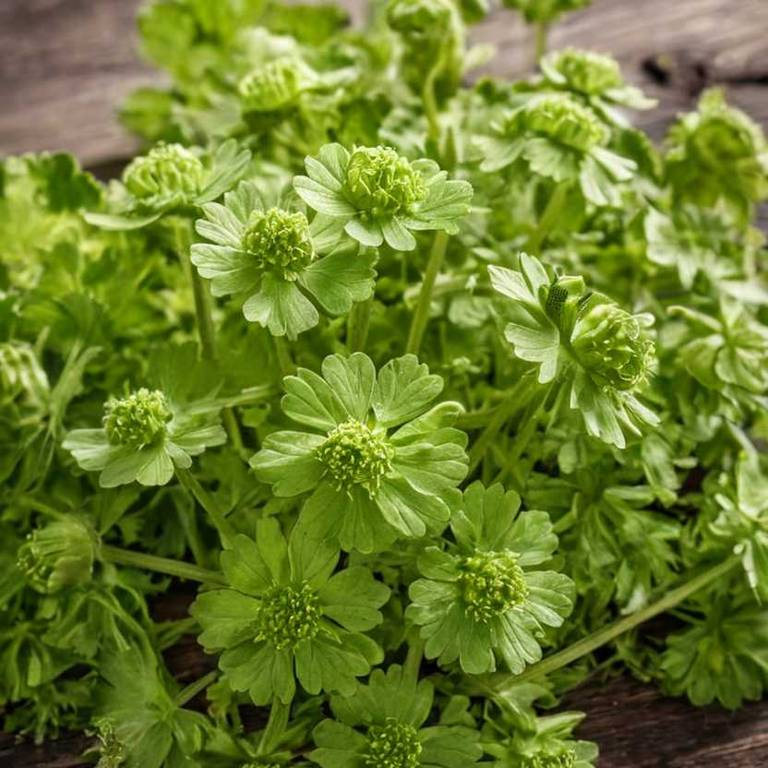10 Best Alchemilla Vulgaris Health Benefits

Alchemilla vulgaris, commonly known as lady's mantle, has been traditionally used for its various health benefits.
It is rich in antioxidants, which help protect the body from oxidative stress and support overall cellular health. This plant is known to have anti-inflammatory properties, making it useful in reducing inflammation associated with conditions like arthritis. Alchemilla vulgaris may also support digestive health by soothing the stomach lining and aiding in the treatment of ulcers.
Additionally, it has been used in herbal remedies to promote menstrual health and reduce symptoms of menopause.
1. Reduces skin inflammation
Alchemilla vulgaris reduces skin inflammation by containing anti-inflammatory compounds such as flavonoids and tannins, which help to soothe irritated skin.
These natural substances work by inhibiting the production of inflammatory mediators like histamines and cytokines. It is commonly used in topical treatments for conditions such as eczema, psoriasis, and rosacea. The plant's astringent properties also help to tighten the skin and reduce redness.
Overall, alchemilla vulgaris offers a gentle and effective way to alleviate skin inflammation through its soothing and healing effects.
2. Promotes wound healing
Alchemilla vulgaris promotes wound healing by stimulating the growth of new tissue and reducing inflammation.
This herb contains anti-inflammatory compounds that help soothe the skin and accelerate the recovery process. It also supports the regeneration of skin cells, which is essential for faster healing. Traditional uses of alchemilla vulgaris have long recognized its ability to aid in the treatment of minor cuts, burns, and skin irritations.
Its natural properties make it a valuable herbal remedy for those seeking alternative methods to enhance wound recovery.
3. Supports digestive health
Alchemilla vulgaris supports digestive health by promoting the balance of gut flora through its antimicrobial and anti-inflammatory properties.
The plant contains compounds that help reduce gastrointestinal inflammation, making it beneficial for conditions like irritable bowel syndrome. It also aids in the digestion of food by stimulating the production of digestive enzymes. Additionally, its high content of mucilage can soothe the lining of the stomach and intestines.
Regular consumption of alchemilla vulgaris may contribute to overall digestive wellness and comfort.
4. Improves liver function
Alchemilla vulgaris improves liver function by supporting detoxification processes and reducing inflammation within the liver.
This herb contains compounds such as tannins and flavonoids, which may help protect liver cells from damage caused by toxins and oxidative stress. It is traditionally used in herbal medicine to promote the regeneration of liver tissue and enhance metabolic functions. Studies suggest that alchemilla vulgaris may aid in the management of liver disorders such as hepatitis and fatty liver disease.
Incorporating this plant into a balanced diet or herbal regimen may offer natural support for maintaining optimal liver health.
5. Boosts immune system
Alchemilla vulgaris boosts immune system through its rich content of bioactive compounds such as flavonoids, tannins, and polysaccharides, which have demonstrated immunomodulatory properties.
These compounds help stimulate the production of white blood cells, enhancing the body's ability to fight off infections and diseases. The plant's anti-inflammatory and antioxidant effects further support immune function by reducing oxidative stress and inflammation. Additionally, alchemilla vulgaris may promote the activity of natural killer cells and other immune components, contributing to a stronger defense mechanism.
Regular use of alchemilla vulgaris can therefore be a valuable natural supplement for maintaining a robust and balanced immune system.
6. Relieves joint pain
Alchemilla vulgaris relieves joint pain by reducing inflammation and providing natural anti-inflammatory properties.
It contains compounds such as flavonoids and tannins that help soothe irritated joints and decrease swelling. This plant has been traditionally used in herbal medicine to treat conditions like arthritis and rheumatism. Its ability to support joint health makes it a valuable remedy for those suffering from chronic joint discomfort.
Regular use of alchemilla vulgaris may help alleviate pain and improve mobility in affected individuals.
7. Enhances skin texture
Alchemilla vulgaris enhances skin texture by promoting cellular renewal and hydration.
Its rich content of flavonoids and tannins helps to strengthen the skin's barrier function, leading to a more resilient complexion. The plant's anti-inflammatory properties reduce redness and irritation, contributing to a smoother and more even skin surface. Additionally, alchemilla vulgaris contains allantoin, which soothes and protects the skin, further improving its overall texture.
Regular use of products containing this herb can result in visibly improved skin clarity and a more youthful appearance.
8. Aids in detoxification
Alchemilla vulgaris aids in detoxification by supporting the body's natural processes for eliminating toxins.
It contains compounds that may help protect the liver, which is the primary organ responsible for detoxifying the body. This herb is believed to enhance the function of the liver and kidneys, aiding in the removal of harmful substances. Its anti-inflammatory and antioxidant properties further contribute to reducing oxidative stress and supporting overall metabolic health.
As a result, alchemilla vulgaris is often used in herbal medicine to promote internal cleansing and improve overall wellness.
9. Alleviates menstrual cramps
Alchemilla vulgaris alleviates menstrual cramps by containing compounds that have anti-inflammatory and analgesic properties.
It works by reducing the pain and discomfort associated with dysmenorrhea, which is the medical term for painful menstruation. The plant's high concentration of tannins and flavonoids helps to soothe uterine contractions and decrease inflammation in the reproductive system. Traditionally used in herbal medicine, it has been valued for its ability to support women's health during their menstrual cycles.
Its natural action makes it a popular alternative remedy for those seeking relief without pharmaceutical interventions.
10. Supports mental clarity
Alchemilla vulgaris supports mental clarity by promoting a calm and focused state of mind.
Its calming properties help reduce mental fatigue and enhance concentration, making it beneficial for individuals seeking improved cognitive function. The plant contains compounds that may support the nervous system, contributing to emotional balance and mental sharpness. Regular use of alchemilla vulgaris can aid in managing stress-related cognitive decline.
As a natural remedy, it offers a gentle way to enhance mental clarity without the side effects of synthetic medications.